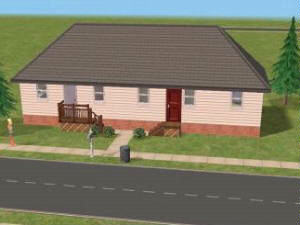Sunday 3 April 2005

|
Pic of the day: Screenshot from Sims 2, so as to not arouse the suspicion of the neighbors by photographing their houses. ^^' House inflationI have found it weird that people do not think prices are prices. I mean, if the price of shoes or bicycles goes up and your wage remains the same, you feel poorer, and rightly so. Even if you happen to already have shoes and a bicycle, you don't feel richer. But if you have a house and the price of houses goes up, you feel rich. This does not really make sense. Yes, it is possible to sell the house, when it is not easy to sell used shoes. But do people actually sell their home and not buy a new one? No, they generally don't, at least not until they are too old to read the papers they are signing. But, you may contend, even if you don't sell your house, you can still use the increased value to borrow more money, which you can then use on things you want. True. But does borrowing money actually make you rich? No, quite the opposite. It makes you poorer and poorer the more you borrow. Not only do you need to pay back the loan, but interest as well. The one situation in which you are actually better off while still living in your house, is if you have borrowed so much already that some of the loan is non-priority, with the corresponding higher interest rate. Then you would do well to re-finance and get lower interest on the top loan. But the fact that you had to borrow that much in the first place is kinda disturbing. And of course, if you are that kind of person, you are likely to look for a more expensive home to buy now that you feel rich, and borrow over the chimney again. When bread and milk become more expensive, it is called inflation. People generally agree that inflation is not a good thing, above a small minimum that serves as a buffer against deflation (which is even worse). When house prices are inflated, people don't look at it that way at all. But it really is the same thing. Houses don't last forever, although it may seem so to the young human. And they certainly don't grow over time by themselves like trees. Even if a house becomes more expensive, your value of living there does not really increase. There is no more space, and you cannot do anything in it that you couldn't do before the inflation. It is the same house, only that now young people have to pay more for their first house. If there is no change in population or in buildings, nobody wins or loses at all. If population grows, society as a whole loses if the price hike spreads to new homes. If population is stable, society as a whole still loses since some houses need to be replaced eventually ... if they don't eventually wear down to the point of being demolished, people still move from some places to other places, leaving their old homes behind. And if population should eventually shrink, still no one is better off since there is no one to sell those extra houses to. In short, house inflation is much like shoe inflation, only with a much larger time horizon. This is hardly a cause for celebration (except possibly for the taxman). |
Yesterday <-- This month --> Tomorrow?